|
|
|
Sort Order |
|
|
|
Items / Page
|
|
|
|
|
|
|
| Srl | Item |
| 1 |
ID:
177657
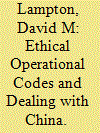

|
|
|
|
|
| Summary/Abstract |
This contribution argues that, without an ethical operational code, scholars’, policymakers’, businesspersons’, and citizens’ policy positions simply become expedient reactions to
perceived problems, opportunities, and interests. Without
ethical footing, policies as a whole will lack coherence, staying power, and persuasive force. Key elements of an ethical
operational code include: philosophical grounding and core
values, concepts of social and historical development, and
rules of thumb derived from an individual’s experience. Providing several examples of China-related policy issues which
would benefit from the ethical operational code approach,
this essay then discusses the analytic elements of an operational code. It concludes by arguing that, in the context of
US-China relations, individuals should develop ethical constructs characterized by patience, more carrots than sticks,
and more open doors than high walls. In what is emerging as
an increasingly ideologically polarized domestic and foreign
policy circumstance in the United States and in U.S.-China
relations, the starting point for an individual needs to be
self-reflection concerning what they believe and why
|
|
|
|
|
|
|
|
|
|
|
|
|
|
|
|
| 2 |
ID:
048142
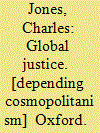

|
|
|
|
|
| Publication |
Oxford, Oxford University Press, 1999.
|
| Description |
xiii, 249p.
|
| Standard Number |
0198294808
|
|
|
|
|
|
|
|
|
|
|
|
Copies: C:1/I:0,R:0,Q:0
Circulation
| Accession# | Call# | Current Location | Status | Policy | Location |
| 042609 | 330.1/JON 042609 | Main | On Shelf | General | |
|
|
|
|
| 3 |
ID:
115197


|
|
|
|
|
| Publication |
2012.
|
| Summary/Abstract |
The debates over global and historical justice much preoccupy contemporary political theory. Yet they have not been analyzed in tandem. And this, despite the fact that a number of theoretical frameworks, principal among them contractarianism and utilitarianism, configure arguments in both debates. In this essay, I show that such arguments, as advanced by either side in each of the two debates, all rest on a set of patterned assumptions about the nature of the self. Specifically, I argue, the debates over historical and global justice resemble each other as parallel contests over the physical, meta-social, metaphysical and social natures of the self. At their cores, the debates over historical and global justice thus display a common and symmetrical structure. I will also show that certain conceptions of the self underlying both the anti-historical justice and the anti-global justice positions are mutually inconsistent. Similar contradictions do not beset the pro-historical and pro-global justice positions.
|
|
|
|
|
|
|
|
|
|
|
|
|
|
|
|
| 4 |
ID:
131899
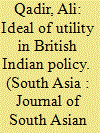

|
|
|
|
|
| Publication |
2014.
|
| Summary/Abstract |
The now natural ideal of defining higher education through its societal utility is a relatively recent historical formation, and in the case of South Asia, its construction is entangled with the colonial history of the institutionalisation of modern higher education in the nineteenth century. Drawing on Robert Young's history of the Bentham-inspired 'chrestomathic' University of London, this article reviews the shifting construction of practicality in British Indian higher education policy in the formative period between 1835 and 1904. The article underlines the continuities and ruptures over time in the policy rhetoric of utility as a normative ideal and points out some implications for understanding colonialism
|
|
|
|
|
|
|
|
|
|
|
|
|
|
|
|
| 5 |
ID:
123411
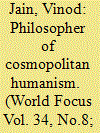

|
|
|
|
|
| Publication |
2013.
|
| Summary/Abstract |
It should be interesting to see how M.N. Roy scanned the development of world philosophy. And also, how he came to develop the philosophy of Cosmopolitan Humanism.
|
|
|
|
|
|
|
|
|
|
|
|
|
|
|
|
| 6 |
ID:
026634
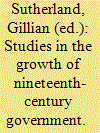

|
|
|
|
|
| Publication |
London, Routledge and Kegan Paul, 1972.
|
| Description |
viii, 295p.Hbk
|
| Standard Number |
0710071701
|
|
|
|
|
|
|
|
|
|
|
|
Copies: C:1/I:0,R:0,Q:0
Circulation
| Accession# | Call# | Current Location | Status | Policy | Location |
| 010464 | 942.081/SUT 010464 | Main | On Shelf | General | |
|
|
|
|
| 7 |
ID:
176080
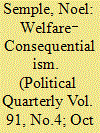

|
|
|
|
|
| Summary/Abstract |
This article is about two ideologies. Welfare‐consequentialism holds that government should adopt the policies that can rationally be expected to maximise aggregate welfare. Populism holds that society is divided into a pure people and a corrupt elite, and asserts that public policy should express the general will of the people. The responses of world governments to the coronavirus pandemic have clearly illustrated the contrast between these ideologies, and the danger that populist government poses to human wellbeing.
The article argues that welfare‐consequentialism offers a vaccine for populism. First, it rebuts populism’s claims about who government is for and what it should do. Second, the pessimism and distrust that make people crave populism can be satiated by successful welfare‐consequentialist government. Finally, welfare‐consequentialism’s sunny narrative of progress can be just as compelling to people as populism’s dark story has proven to be.
|
|
|
|
|
|
|
|
|
|
|
|
|
|
|
|
|
|
|
|
|